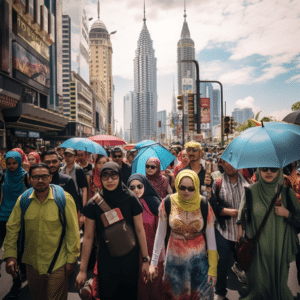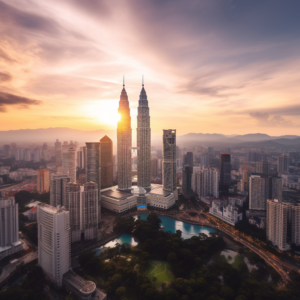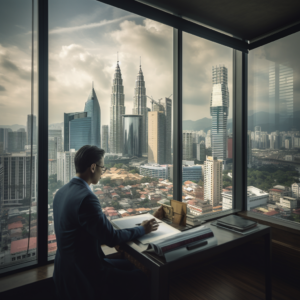Sitemap: Living abroad > Living in Malaysia
Embarking on the expatriate journey in Malaysia is a rich exploration of economic opportunities and cultural diversity.
Whether considering retirement, real estate, stock market investments, or business setup, Malaysia offers a wealth of possibilities for a fulfilling expat journey in this enchanting Southeast Asian gem.
If you are looking to invest as an expat or high-net-worth individual, which is what I specialize in, you can email me (advice@adamfayed.com) or WhatsApp (+44-7393-450-837).
This guide navigates the expatriate experience, from top international schools to healthcare and local culture. Discover transportation, vibrant nightlife, and recreation against Malaysia’s diverse climate. Uncover the essence of expat life, communities, and the professional landscape.
The topics covered in this page include:
- Living in Malaysia 101
- Education in Malaysia
- Healthcare in Malaysia
- Local culture in Malaysia
- Cost of Living in Malaysia
- Expat Communities in Malaysia
- Investing in Malaysia
Living in Malaysia 101
Living in Malaysia offers a harmonious blend of cultural diversity, modern amenities, and a relaxed lifestyle.

From the bustling metropolises like Kuala Lumpur to the serene landscapes of Penang and Borneo, expatriates are embraced by friendly locals, delicious cuisine, and a range of recreational and professional opportunities.
Education in Malaysia
In Malaysia, public schools are exclusively for citizens, leading expats to choose private or international schools, albeit with higher fees.
Malaysian citizenship requires primary education (7–13 years) and optional secondary education, culminating in a lower certificate of education.
Private and international schools in Malaysia offer diverse curricula, such as the Cambridge IGCSE, boasting smaller ratios and better facilities.
As an emerging international study hub, Malaysia aims to host 250,000 international students by 2025, with globally recognized universities.
Universiti Malaya, ranked 70th globally, is the costliest, with study costs ranging from US$11,800 for a three-year Bachelor’s to US$160,300 for a five-year medical degree, showcasing Malaysia’s diverse academic appeal.
Related Content: 19 Best International Schools In Malaysia
Healthcare in Malaysia
The healthcare expenses in Malaysia hinge on the choice between the universal healthcare system and private options.
Administered by the Malaysia Ministry of Health, the public healthcare system mirrors the UK’s NHS model but operates without a national insurance program. Instead, the government heavily subsidizes costs, enabling affordable access for patients.
Minor incidents, like a cold, may cost just US$10, with a private hospital room’s overnight stay around US$50.
Despite having a modest healthcare budget at 2.58% of GDP, Malaysia aims to increase it to 5% by 2030.
Opting for a comprehensive international health insurance policy provides access to top-notch healthcare facilities in Malaysia, encompassing both public and private services.
Transportation in Malaysia
Trains, buses, and taxis are all easily accessible in Malaysia’s main cities, and public transit is clean, cheap, and punctual.
One of the most well-liked modes of public transportation among both native-born Malaysians and foreigners is the KTM Komuter rail system, which connects many different neighborhoods inside the city.
While ride-hailing apps like Grab are popular and offer a quick method to move around, it can be difficult to acquire a service after 10 PM in some parts of Kuala Lumpur, let alone in smaller cities in Malaysia.
Local Culture in Malaysia
Malaysia, a diverse nation with Malay, Chinese, Tamil, and Filipino communities, requires expats to adapt to the pervasive Islamic influence shaping daily life, politics, and rituals.
The Islamic call to prayer is integral, necessitating adjustment. The tropical climate and urban congestion may pose challenges during the adaptation period.
Understanding local customs is crucial; using the left hand is discouraged, and certain gestures are deemed disrespectful.
Malaysians maintain personal space in conversations, avoiding physical contact with women in public.
Assimilating into Malaysian society and respecting local customs facilitate better interactions with the diverse populace and enrich expat experiences.
Cost of Living in Malaysia
In 2022, Malaysia presented an enticing prospect for expatriates, with the cost of living 43.47% lower than the UK and 51.74% lower than the US.
Kuala Lumpur, despite being the most expensive city, boasts a 78% satisfaction rate among residents regarding living expenses, surpassing the global average of 43%.
With a flourishing export-oriented economy, low national income tax, and overall affordability, Malaysia secures the 12th spot in global competitiveness.
While living costs vary across states and urban-rural landscapes, Kuala Lumpur remains notably more economical than other Asian and Western counterparts.
Despite inflation and post-COVID-19 economic recovery, income disparities persist, exacerbated by the indirect impact of the Russian-Ukrainian war on supply chains, leading to elevated food and fuel prices.
Accommodation costs, a significant expat expenditure, are generally reasonable, with Kuala Lumpur rents 80% cheaper than London and 87% lower than New York, necessitating around 20.5% of income for housing, albeit subject to location variations.
Related Contents:
Expat Cost of Living in Malaysia
Cost of Living in Shanghai vs Kuala Lumpur
Recreation and Nightlife in Malaysia
Malaysia boasts a diverse array of recreational and nightlife experiences, catering to various preferences.
From pristine beaches and lush rainforests to modern entertainment hubs, the country offers abundant recreational options.
Popular destinations like Langkawi and Penang provide water activities, while the Cameron Highlands offer a cool escape for nature enthusiasts.
Urban centers like Kuala Lumpur and Penang host vibrant nightlife scenes with trendy bars and energetic nightclubs.
Cultural festivals and events bring the streets to life, showcasing Malaysia’s rich heritage.
Whether immersed in serene landscapes or the dynamic cityscape, Malaysia’s recreation and nightlife promise engaging experiences for locals and expats.
Climate in Malaysia
Southeast Asia experiences a tropical climate characterized by either hot and humid or hot and dry conditions, depending on the season.
The dry season, lasting from January to August, brings rising humidity and the onset of the monsoon. Daily temperatures average 85 F, spiking to 95 F in the dry season and dropping to around 80 F during the cooler monsoon period.
June to August sees eight inches of rainfall, with brief but intense afternoon downpours. September and October mark the more severe monsoon, with 13 to 15 inches of rainfall and 21 to 25 rainy days.
Despite the rain, Malaysia offers a friendly, comfortable lifestyle with low crime rates and a high standard of living, making it an appealing destination.
Expat Life in Malaysia
As a people, Malaysians are kind and welcoming. Plus, it helps to know that you can speak English if necessary the moment you get off the plane.

An enormous number of expats, both employed and retired, live in Malaysia. Constructing friendships will not be an issue for you.
If you’re looking to connect with other expats, Facebook is a great place to start. In less than a minute, over six groups devoted to Penang expats will load.
Related Content: Moving to Malaysia Guide for Expats
Expat Communities in Malaysia
Kuala Lumpur
The capital city hosts a diverse expat community drawn to its vibrant culture, business opportunities, and modern amenities. Popular expat neighborhoods include Bangsar, Mont Kiara, and Damansara Heights.
Penang
Georgetown, the capital of Penang, attracts expats with its historical charm, diverse cuisine, and laid-back lifestyle. Areas like Tanjung Bungah and Gurney Drive are popular among the expatriate community.
Johor Bahru
As a rapidly developing city, Johor Bahru has become a hub for expats, particularly those commuting to Singapore. Nusajaya and Medini offer modern living options with proximity to amenities.
Kuching (Sarawak)
Kuching, in the state of Sarawak, appeals to expats seeking a more relaxed pace of life. The expat community is attracted to the city’s rich cultural heritage, nature, and friendly locals.
Kota Kinabalu (Sabah)
Kota Kinabalu, located in Sabah, offers a mix of urban and natural attractions. The expat community enjoys the city’s proximity to beautiful landscapes and a range of outdoor activities, making it an appealing destination in Malaysian Borneo.
Working in Malaysia as an Expat
Working in Malaysia offers various avenues, with the most favorable being employment as an expatriate sent by an international employer.
This expat package often translates to a prosperous lifestyle. Attempting to find work after arriving independently may prove challenging, especially on a tourist visa, unless one possesses extensive education and experience in a sought-after field.
Malaysian employers typically prefer local hires due to favorable conditions. The optimal approach involves identifying international companies active in Malaysia, particularly those also present in your home country, and applying directly.
Utilizing professional networks, LinkedIn, or engaging with headhunters can enhance opportunities for those with higher education.
Related Contents:
Working In Malaysia As An Expat
How to become a digital nomad in Malaysia in 2023
Work Permit in Malaysia for Expats
In Malaysia, hiring foreigners is contingent on proving the unavailability or unwillingness of local candidates, particularly for strategic roles like management.
With a well-educated local workforce, qualifications such as a bachelor’s or preferably a master’s degree, coupled with work experience, are imperative.
Work permit eligibility requires a minimum age of 27 and a monthly income of at least RM5,000. For swift approval, contracts exceeding RM8000 monthly guarantee a one-week processing time.
Highly skilled expats can secure a special 10-year visa, promoting the retention of top talent. Permits are typically issued for 1 to 2 years, with renewal options.
Expats contribute to Malaysia’s pension scheme (EPF), although this doesn’t apply to foreign workers. Malaysia’s tax system, often avoiding double taxation, has a maximum rate of 26 percent.
Salary in Malaysia
Expats on employer-sponsored expat packages often earn well over RM10,000 monthly, inclusive of perks like relocation and car allowances.
While stories circulate about expats earning RM50,000, this is rare. RM10,000 allows for a decent lifestyle in Malaysia, covering rent and occasional indulgences.
For those earning RM15,000 to RM20,000, a luxurious life is feasible with high-end rentals and fine dining.
Locals typically earn RM2,000 to RM4,000, while service industry workers earn less, sometimes below RM1,000.
Those on local packages might earn RM5,000 to RM8,000. Skilled individuals with experience command higher salaries, providing comfort on an RM5,000 contract.
Expat Tax in Malaysia
Non-residents face withholding taxes on specific income types, with a 30% tax rate on other income.
Knowledge workers in Malaysia’s Iskandar Development Region employed by designated companies may apply for a reduced tax rate of 15% if their employment began between October 24, 2009, and December 31, 2015, provided they had no Malaysian employment income for three years before applying.
Malaysian professionals returning under the Returning Expert Programme are taxed at 15% for the initial five years.
Women rejoining the workforce after a two-year hiatus as of October 27, 2017, may enjoy tax exemption for up to 12 consecutive months, applicable until December 31, 2023.
Related Content: Malaysia Expat Tax: Best Guide in 2023
Retiring in Malaysia
Malaysia offers one of the world’s premier retirement visa options, the “Malaysia My Second Home” (MM2H).
This program provides expatriates aged 50 and above with a 10-year multiple-entry visa, automatically renewable.
To qualify, individuals must deposit RM150,000 ($34,883) in a Malaysian bank or demonstrate a monthly government pension income of RM10,000 ($2,350).
The deposit is waived with a government pension, and tax exemptions apply to money brought into the country.
After one year, visa holders can withdraw RM50,000 ($11,627) for various purposes, including car purchase, education, medical expenses, or property investment, with Malaysia being one of the few places in Asia allowing freehold property ownership.
Related Contents:
How to Retire in Malaysia in 2022
How to Get Malaysia Residency by Investment
Investing in Malaysia
Investing in Real Estate in Malaysia
Expats find seamless property acquisition in Malaysia through the Malaysia My Second Home (MM2H) scheme, encouraging foreign investment.
MM2H visa prerequisites include an annual income exceeding US$9,000, a property fixed deposit surpassing US$250,000, and payment of immigration fees with a security bond.
Without MM2H, expats can still purchase property, subject to conditions such as a valuation above US$250,000, exclusion from Malay Reserved land, and non-participation in projects allocated to the Bumiputera group.
Malaysian citizens face restrictions on purchasing low and medium-cost residential units, with additional considerations involving legal fees, estate agent fees, and a 0.5% stamp duty.
Related Content: Why you shouldn’t invest in Malaysian real estate in 2023
Investing in the Malaysian Stock Market
Bursa Malaysia, housing over 900 listed companies in diverse sectors, presents a robust stock market avenue.
With opportunities spanning consumer goods, healthcare, technology, and more, investors can build well-diversified portfolios to mitigate individual stock risks.
As an upper-middle-income country, Malaysia’s resilient economy achieved a remarkable 8.7% real growth in 2022, and 2023 projections foresee a 4% expansion.
The nation’s economic strength is evident in the Q3 2023 growth of 3.3%, surpassing expectations.
As a key player in Asia’s trade, Malaysia sustains a diversified export base, attracting high-quality foreign direct investment (FDI), with FDI approvals constituting 4% of GDP.
Notably, China’s growing FDI presence reinforces Malaysia’s status as a Southeast Asian manufacturing hub.
Related Contents:
12 Best Online Trading Platforms in Malaysia
How To Buy US Stocks From Malaysia
Setting Up a Company in Malaysia
Embarking on entrepreneurship in Malaysia proves both thrilling and demanding, given its status as the 12th most optimal country for business.
Malaysia, welcoming foreign entrepreneurs with its favorable environment, allows foreigners to start businesses due to participation in trade agreements and a pro-foreign investment stance.

However, nuanced restrictions exist on business types and sectors. To navigate, foreigners must select a suitable business entity: Branch Office, Representative Office, Private Limited Company, Sole Proprietorship, Partnership, or Limited Liability Partnership.
While Malaysia offers immense potential, successful entrepreneurship demands meticulous planning, regulatory compliance, and thorough research, underscoring the importance of professional advice in navigating this dynamic business landscape.
Related Content: How To Set Up A Company In Malaysia
Banking in Malaysia
Modern banking in Malaysia traces its roots back four centuries, gaining institutionalization and structure in the mid-1950s amid a diversifying economy.
The Central Bank of Malaysia (BNM) emerged in 1959, fostering financial stability and a robust financial structure.
By the 21st century, Malaysia’s banking sector thrived, offering commercial and personal banking, internet banking, business services, and consumer loans.
The financial system comprises banks, including BNM and other financial entities, constituting 70% of total financial assets.
Non-bank financial institutions, flourishing since the late 1980s, now include ten anchor banks, 15 commercial banks, and 10 Islamic banks across the nation.
Related Contents:
Best Wealth Management Banks In Malaysia
Islamic Banking in Malaysia
Islamic banking emerged in the late 1970s to suit Muslim nations’ Shariah-compliant finance needs. In 1983, Malaysia launched the first Islamic bank, Bank Islam Malaysia Berhad (BIMB), offering a wide range of Shariah-compliant services.
BIMB’s performance led to the 1999 founding of Bank Muamalat Malaysia Berhad. Malaysia’s dual banking system, which blends Islamic and conventional banking, has over 70 Islamic banks globally.
Under the Islamic Banking Acts, Malaysian Islamic banks with assets over RM 10 billion expand and adhere to Shariah principles.
The Islamic Interbank Money Market and National Syariah Advisory Council reinforce Malaysia’s global Islamic banking leadership.
Final Thoughts
Malaysia beckons expatriates with a wealth of opportunities and a rich cultural tapestry. From top-notch international schools to world-class healthcare and efficient transportation, the country ensures a quality lifestyle.
The diverse local culture, combined with a reasonable cost of living, offers a vibrant backdrop for both recreation and nightlife.
With a welcoming expat community, favorable climate, and robust investment prospects in real estate and the stock market, Malaysia emerges as an ideal destination for those seeking a fulfilling expat life, whether working, retiring, or investing.
Pained by financial indecision?

Adam is an internationally recognised author on financial matters with over 830million answer views on Quora, a widely sold book on Amazon, and a contributor on Forbes.

